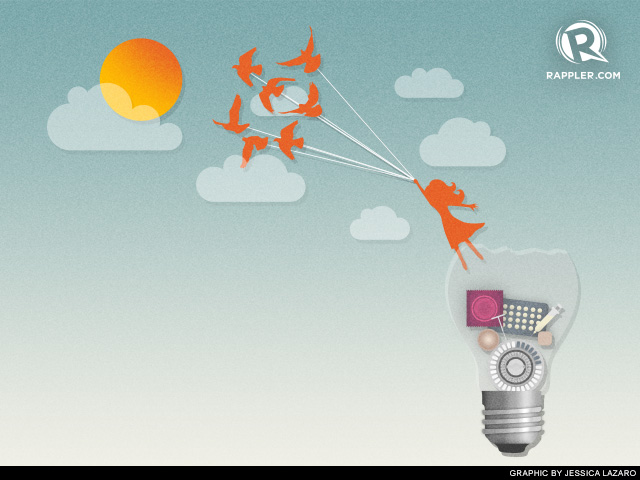SUMMARY
This is AI generated summarization, which may have errors. For context, always refer to the full article.
 KUALA LUMPUR, Malaysia – The baby was still pinkish in color and wrinkled, barely able to open his eyes.
KUALA LUMPUR, Malaysia – The baby was still pinkish in color and wrinkled, barely able to open his eyes.
The mother, Jeremy, sat on a narrow bed next to him, watching her newborn son.
It may have been the exhaustion from the delivery or the warped hormones that had yet to normalize, but Jeremy seemed to lack the delight that usually comes with welcoming a new baby.
I tried to talk with her and found out that this was her second child.
“Are you planning to use family planning? What method are you planning to use?” I asked in Filipino.
“Ano yun? Hindi ba pang mag-asawa lang yun? ‘Di kasi kami kasal ng papa nya, eh,” She replied with a blank stare. (What is that? Isn’t that just for married people? I’m not married to the father of my kids.)
Jeremy had just given birth to her second child when I met her in the lying-in clinic in Malabon, a city north of Manila. She was 16 years old.
Perhaps she felt powerless, a sense of resignation to having children.
For Jeremy, the idea of having control of her fertility was a foreign concept that did not apply to her.
Teen pregnancy epidemic
The same blank look on Jeremy’s face is common among many teen mothers, and not just those who live in marginalized communities.
“Some do not fully understand how they got pregnant because they do not know how their bodies work,” said Dr Emma Llanto, an adolescent reproductive health specialist with the University of the Philippines-Philippine General Hospital (UP-PGH).
Others, like Jeremy, only think of family planning (or controlling their fertility) after having their first child.
“Family planning is not planning ahead, it is an after thought that only applies to those who are mothers already or married couples,” according to Ami Evangelista-Swanepol, whose NGO, Roots of Health, works with the students in Palawan State University.

Women deliver
I’m reminded of Jeremy now as I am attending the Women Deliver Conference in Kuala Lumpur Malaysia. At the last Women Deliver conference that I attended in 2010, Bangladesh reported that they were able to reduce their maternal mortality rate by half in less than a decade—from 724 deaths per 100,000 live births in 1990 to 338 per 100,000 in 2008.
This achievement was attributed to the increased access to girls’ education.
In 2001, the Bangladesh government began offering free education for girls up to 12th grade, with additional incentives like food for education. According to the UNICEF, girls’ enrolment in secondary schools jumped from 1.1 million in 1991 to 3.9 million in 2005.
Today, Malaysian Prime Minister Datuk Seri Najib Tun Razak reported a similar achievement. Malaysia has reduced its maternal mortality rate by 45% – from 53 per 100,000 in 1990 to 29 per 100,000 live births in 2010. The country is on track to meeting its Millennium Development Goal by 2015.
Malaysia has one of the lowest maternal mortality ratios in the region.
“When our girls and women are educated, healthy, and independent, the benefits extend beyond individual freedom to prosperity and achievement,” the Malaysian leader stressed. [WATCH: The prime minister’s full welcoming address at the Women Deliver Conference]
Educated girls
Over and over again, study after study will tell us that education is the single most important factor in improving the life of a young girl.
An educated girl will make better choices; an educated girl will be able to find work and make a career for herself; an educated girl will be able to freely choose to delay marriage and control the number of children she will have.
The power of education is far greater than the knowledge it imparts. Education instills courage in one’s capabilities, and in the process, plants little nuggets of hope.
It dares us to dream for ourselves and provides us with the necessary encouragement of seeing our own potential.
I realized that this is what was missing from Jeremy that day.
If we educate a girl and encourage her to imagine that she can be just anything she wants to be, perhaps we will not have to tell her not to have sex or scare her into not getting pregnant.
An educated girl will figure it out on her own; that validation comes from herself and not from a baby or a man; and most importantly, that having a dream for herself is the best form of contraception. – Rappler.com
Ana P. Santos is currently in Kuala Lumpur, Malaysia attending Women Deliver 2013, the largest international convention on maternal health. Women Deliver is a global advocacy organization bringing together voices from around the world to call for action to improve the health and well-being of girls and women. In 2010, Ana attended Women Deliver in Washington, DC as a media scholar. She blogs at www.sexandsensibilities.com and tweets at @iamAnaSantos.
Add a comment
How does this make you feel?
There are no comments yet. Add your comment to start the conversation.